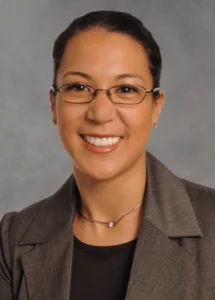A Cervical Cancer Task Force Update from Newly Elected Chair, Deanna Teoh, MD, MS, FACOG

Deanna Teoh, MD, MS, FACOG
I am honored to have been appointed co-chair for the Society of Gynecologic Oncology Cervical Cancer Task Force. In recent years, we have seen incremental improvements in survival for patients with advanced or recurrent cervical cancer with the addition of pembrolizumab to chemotherapy and improvements in outcomes in the locally advanced setting with the addition of induction chemotherapy prior to chemoradiation therapy or the addition of pembrolizumab to chemoradiation therapy. While we continue to figure out how these regimens fit into future treatment algorithms, we also should pause and acknowledge that we first need to improve access to treatment, which is unequivocally considered standard-of-care.
The December issue of Gynecologic Oncology included two manuscripts highlighting disparities in the receipt of standard-of-care therapy in the United States. The first paper by Summey et al showed that Black patients with cervical cancer amenable to surgery had a 40% greater risk of death after adjusting for confounders significantly associated with death. This was irrespective of surgical approach, open vs. minimally invasive, and additional analysis showed that Black patients were 10% less likely to receive guideline-concordant care.
The second manuscript by Kumar et al showed that despite evidence that stereotactic and intensity modulated radiation therapy boosts provide inferior oncologic outcomes compared to brachytherapy boost, that the overall use of brachytherapy across the United States is decreasing, with many studies showing utilization of approximately 50%. Further, a National Cancer Database study showed that only 29% of patients received standard radiation therapy within the optimal interval of 56 days. Disparities in receipt of brachytherapy and timely care persist by patient race and socioeconomic status.
The SGO Cervical Cancer Task Force comprises a multidisciplinary group of SGO members dedicated to identifying and promoting actionable steps to reduce disparities in the receipt of guideline-concordant care for cervical cancer, and to ensure that all patients with cervical cancer have access to high-quality care. The Cervical Cancer Task Force will collaborate with other existing SGO committees and task forces and other national and international organizations to accomplish these goals.
I look forward to working with Mark Einstein, MD, MS, and the rest of the Task Force to accomplish these goals and fulfill the vision created by Wendy Brewster, MD.
Be sure to register for the 2024 Annual Meeting on Women’s Cancer, where you can participate in a session on March 16th facilitated by members of Task Force called “Cervical Cancer Eradication: It Takes a Village.”